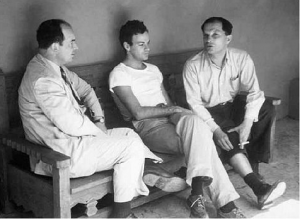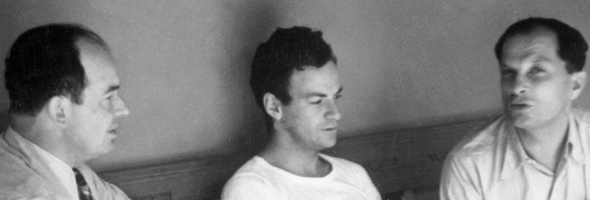
If the atomic bomb had shocked the Japanese, it had also shocked America. Materializing from secrecy to such conquering effect, it seemed a mysterious and almost supernatural force. It was a new fact dropped into the world- “a new understanding of man, which man had acquired over nature,” as I. I. Rabi called the first explosion at Trinity- and no one at first knew quite what to do with it. The discovery of how to release nuclear energy was a technological revolution, most of all a revolution in war; like all revolutions, its meaning would not necessarily accord with hopes or theories or prophecies, but would reveal itself over time as individuals and governments maneuvered to exploit its energies and adapt it to their goals.
The scientists who worked on the bomb also materialized from secrecy and found it necessary to explain themselves. “It kind of felt like you were caught out in the street without any clothes on,” [Los Alamos experimental physicist Raemer] Schreiber recalls. “I mean, we were so accustomed to having all this all so hush-hush, to have it all out in public took a little getting used to… That was also the time one realized that it would be impossible to simply say, those are fine gadgets, they ended the war and now let’s just lock everything up and forget about it. Really one had to live with this situation from here on.” But even that seemingly obvious conclusion was debatable. “We all felt that, like the soldiers, we had done our duty,” Hans Bethe writes, “and… deserved to return to the type of work that we had chosen as our life’s career, the pursuit of pure science and teaching… Moreover, it was not obvious… that there was any need for a large effort on atomic weapons in peacetime.”
…
Richard Feynman, who had driven his roommate Klaus Fuch’s old Buick down to Albuquerque the previous June, in the midst of the final effort to finish the bombs, to keep vigil with his young wife Arlene while she died of tuberculosis, found himself lost between worlds. Before he left Los Alamos he had thought about what the bomb meant and had made some notes. He had calculated that Little Boys in mass production would cost about as much as B-29s. “No monopoly,” he had written. “No defense.” And: “No security hindered in the development of the bomb by any secrets we are keeping… Soon they will be able to do to Columbus, Ohio and hundreds of cities like it what we did to Hiroshima. And we scientists are clever- too clever- are you not satisfied? Is four square miles in one bomb not enough? Men are still thinking. Just tell us how big you want it!” The twenty six year old widower may have seen too much of death. He sat in a bar in Manhattan one afternoon in the months after the war looking out the window at all the people going by and shaking his head, thinking how sad it was that they didn’t realize they had only a few years to live. On Bethe’s recommendation, Cornell snapped him up, but creative work eluded him in that time of grieving until he took to heart the advice that the Hungarian mathematician John von Neumann had tendered him at Los Alamos during the war. “We used to go for walks on Sunday,” Feynman recalls. “We’d walk in the canyons… It was a great pleasure. And von Neumann gave me an interesting idea: that you don’t have to be responsible for the world that you’re in.” He had not been able to fix Arlene; why should he presume he could fix the world?
Part 2, Chapter 11

